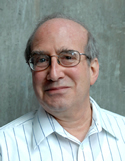News & Events > Department News > Lytle Lecture Series
Dr. Alan S. Willsky
The Dean Lytle Electrical Engineering Endowed Lecture Series

Edwin Sibley Webster Professor of Electrical Engineering & Computer Science
Director, Laboratory for Information & Decision Systems
Massachusetts Institute of Technology
Host: EE Professor Howard Chizeck
Co-host: EE Professor Jenq-Neng Hwang, Chair,
Lytle Endowed Lectureship Committee
Learning & Inference for Graphical & Hierarchical Models:
A Personal Journey
[Watch the video] [View the slides]
Technical Colloquium
Tuesday, May 14th, 2013, 10:30-11:20am
Room 105, Electrical Engineering Building
Map and directions
Abstract
This talk will provide an overview of a personal perspective on inference and learning for graphical models, one that began with work on multi-resolution models for signals and images but that has evolved into a more general look at inference and learning especially for graphical models for which these tasks are tractable and scalable to large problems.
The talk will begin with a brief introduction to Markov models on undirected graphs and message-passing algorithms, often known as Belief Propagation, that exactly solve inference problems on a very special set of graphs, namely those without loops or cycles, i.e., trees. We’ll then turn to building or learning models on such graphs, including ones that explicitly have hierarchical structure and will comment on some of the differences between the questions that have typically been addressed in very different communities (namely machine learning and system theory). We’ll then provide a new method for learning models on trees with hidden nodes.
The rest of the talk will deal with a look at what happens if one considers graphs with loops. We first look at what is known as Loopy Belief Propagation and provide, for the Gaussian case, an explicit picture of what it does and when and why it works and when it doesn’t based on what we call walk-sum analysis. We then use these ideas to describe another new set of algorithms based on the graph-theoretic concept of a feedback vertex set (i.e., a set of nodes in the graph that, if removed, leave a cycle-free graph). As time allows we’ll discuss the learning of several other classes of graphical models, where in each case, the objective is to learn models for which both the learning of these models as well as exact or nearly exact inference using these models is computationally feasible.
Building a Career on the Kindness of Others1
Being in the Right Place at the Right Time2
...And if You Come to a Fork in the Road...3
[Watch the video] [View the slides]
For General Audience
Wednesday, May 15th, 2013, 3:30-4:30pm
The Paul G. Allen Center - Microsoft Atrium
Map and Directions
Abstract
The career path of an academic, over a period of more than 40 years, is filled with unexpected events, circuitous paths, and always the influence of mentors, colleagues, friends, and students. In this talk, I’ll take a look at that journey, stopping to describe research directions and results along the way, but, more importantly (at least to the speaker) pointing out the lessons learned about research, intellectual inquiry, and the great good fortune that comes from the wisdom and insights of others, from being in the right place at the right time, and from following forks in the road with enthusiasm and effort.
This path stretches from its beginnings in systems and control, to a summer job that turned into a substantive new research direction, to an invitation to write a textbook that led to a shift toward signal processing, to the enriching experience of helping build a successful company, to a trans-Atlantic collaboration that led to the launch of a different research direction and ultimately to a move toward machine learning. In addition to describing the lessons learned along this path, the speaker will also endeavor to provide reasons to believe that these intellectual migrations were more than the manifestation of a short attention span.
1 With apologies to Tennessee Williams and Blanche DuBois
2 See: Forest Gump
3 With thanks to Yogi Berra
Biography
Alan S. Willsky is the Edwin Sibley Webster Professor of Electrical Engineering and Computer Science and Director of the Laboratory for Information and Decision Systems at MIT. Dr. Willsky was a founder, member of the Board of Directors, and Chief Scientific Consultant of Alphatech, Inc. Dr. Willsky has held visiting positions at several institutions in England and France. He has authored more than 200 journal papers and 350 conference papers, as well as two books, including the widely used undergraduate text Signals and Systems. Prof. Willsky has received numerous awards, including the 1975 American Automatic Control Council Donald P. Eckman Award, the 1980 IEEE Browder J. Thompson Memorial Award, the 2004 IEEE Donald G. Fink Prize Paper Award, a number of other best paper awards, and an honorary doctorate from Université de Rennes. Prof. Willsky received the 2009 Technical Achievement Award from the IEEE Signal Processing Society and in 2010 was elected to the National Academy of Engineering.
Prof. Willsky is the leader of MIT’s Stochastic Systems Group. His early work on methods for failure detection in dynamic systems is still widely cited and used in practice, and his more recent research on multiresolution methods for large-scale data fusion and assimilation has found application in fields including target tracking, object recognition, oil exploration, oceanographic remote sensing, and groundwater hydrology. Dr. Willsky’s present research interests are in problems involving multidimensional and multiresolution estimation and imaging, inference algorithms for graphical and relational models, statistical image and signal processing, data fusion and estimation for complex systems, image reconstruction, discovery of models for complex interacting phenomena, and computer vision.





